- Home
- Steve Erickson
Zeroville: A Novel Page 9
Zeroville: A Novel Read online
Page 9
“Is it you?” Perhaps there’s a slight slur to her words.
“No. At the top of the rock is ancient white writing. The rock is open, like a …” Vikar stops and after a moment says, “I cheated on Elizabeth Taylor.”
“There’s no such thing,” Dotty says, “as cheating when you go to the movies. Don’t you know that? Just like there’s no such thing as cheating in dreams. In the movies you get to fall in love with who you want, sleep with who you want, live happily ever after as often as you want. Liz,” she says, “understands. If anyone understands, it’s Liz.”
“When you work on a movie like that, do you know what it’s going to be?”
She turns in her seat. “Can we have two more? Excuse me?” The bartender in the shadows on the other side of the room looks up. “Two more?”
Vikar hasn’t started his first one yet. “When you’re making a movie like A Place in the Sun?”
“You mean do you know it’s going to be great?” She shrugs, “Of course not. You understand you’ve got a first-rate director, a first-rate cinematographer, a fairly blazing cast … ironically, at the time the gamble was Liz, she hadn’t done anything grown-up, and Shelley was cast completely against type—but Monty, Monty was the hot young actor in Hollywood, he already had done Red River, The Search with Fred Zinnemann, and, uh …” she stops to think, shaking her head groggily, “… oh God …”
“Are you all right?”
“The other one. First picture I ever worked on.” The drinks come. “Monty and Olivia de Havilland.”
“The Heiress.”
“The Heiress. I wasn’t supposed to be on that at all because I wasn’t union, always suspected it might have been Monty himself who got me in—he was sweet that way. Up till then I was a messenger girl on the lot running notes back and forth among Billy Wilder and Jean Arthur and Marlene Dietrich, who were making a picture and couldn’t abide each other. Cutting was easier than a lot of things for a woman to get into, because in their quaint way Mayer and Warner and Zanuck and Zukor all had this idea that editing was like sewing. Brando was just coming along, shooting Streetcar when we were doing Sun, still an unknown quantity as far as pictures were concerned—so Monty was it and everyone knew except maybe sometimes Monty himself, who always had that thing great artists have, tortured doubt half the time and arrogance the other half … or maybe he knew he was It and couldn’t stand it. I worked on another picture with him years later, Suddenly, Last Summer, after his accident, and it was even more obvious then when you could see what he lost, not just his face but his spirit. At his peak he seemed somehow both modern and classic at the same time … so we knew we had the stuff for a good picture. But when you’re actually shooting the thing? You don’t know the iris of Monty’s eye is going to turn into a distant boat on a lake. At the moment you’re shooting it, Monty’s just another flesh-and-blood entity, right there, right then, before he gets turned into something else. Before he gets translated.” She says, “I suppose I’m one of the first people who has an idea a picture might be special, because in the editing room that’s when it really gets made into what it is.”
“Yes.”
Dotty lets out a sigh so heavy it startles him. “Young man, most pictures, they stay in the time they’re made. A really good picture—say, Casablanca—lives beyond the time it’s made, and then there are a few perfect pictures, a few sublime pictures—The Third Man, The Shop Around the Corner, that silent Joan of Arc picture of yours—that exist before they’re made …”
“The movie is in all times,” says Vikar, “and all times are in the movie.”
“… but the making of any movie, it’s in the here-and-now, it’s in the here-and-now no matter how much you want to be some place else,” the bourbon beginning to take over, “any place else. Sometimes you throw yourself into the work just to get out of the here-and-now. When I was working on the Stevens picture, the here-and-now,” she blinks heavily, “was the hell-and-gone. I was,” she takes another drink, “in love, of course. Ever been in love, of course?”
“No, I’ve been a bartender all my life.”
She blinks at him. “What?”
“It’s from My Darling Clementine.”
“This isn’t a joke,” she says quietly.
“I’m sorry.”
“Fuck it.”
“I’m sorry.”
She lapses into a deep silence. “Fuck it.”
105.
She says, “I was twenty-nine, about to turn thirty, which in those days was like being, well, practically like being the age I am now, ha. He was thirty-nine, an actor—a married actor … you knew that was coming, didn’t you? … big actor of the day though I don’t know how many remember him now … couple of Oscar nominations, even some loose talk about him for the Monty role in Sun, but Monty was in the middle of his hot streak and this other actor, his hot streak was ending. Boxing picture, Lana Turner picture, crazy Joan Crawford picture where he played, uh … a violinist? Or … and this big prestige picture about anti-Semitism everyone was talking about … So the world saw this guy who seemed on a hot streak when, really, everything was coming apart. A few years before, he and his wife lost their little girl, to a sore throat, if you can believe it—so his marriage was falling apart and he and I were sleeping together and it was all very hot hot hot going cold cold cold, dead cold, cadaver cold, and if the public didn’t know, well he knew and I knew and Hollywood knew and the House Un-American Activities Committee, they sure well knew. Someone’s been drinking my drink,” she says suspiciously, holding the bourbon glass up to the dim Nickodell light, then dropping her head back again on the red upholstery behind her and Vikar can’t tell if the bourbon is making her memories hazier or bringing them into focus, “… all falling apart … ran Ingrid out of the country for having a baby by a husband that didn’t happen to be hers—well at least he was a husband, hey, Vikar? somebody’s husband—ran out Orson for having been a loose cannon ever since they wheeled him on deck, ran out Chaplin for his politics or for not paying his taxes or liking his girls too young or take your pick or take the whole lot. The courts made the studios sell off their theater chains, people were hauled in front of Congress for being stupid enough to attend some meeting fifteen years before, then there was television which as far as the studios were concerned was worst of all. Night Jules died, not long after I finished Sun, he was in New York and called me here in L.A. and I could tell he was in trouble. I got the next plane out. Never belonged to anything in his life let alone anything political, it wasn’t his style—didn’t know any names to name but wouldn’t have named any if he had, of course, and they knew that, of course, and while the Committee’s about to charge him with perjury he’s also getting it from the other side, the lefties who’re pissed at him for testifying at all, including his wife, she’s busting his balls too. Got to the city about one in the morning, let myself in the flat there in Gramercy Park that a friend kept for us in her name, I could smell the liquor and cigarette smoke and I could hear him sleeping and I curled up and went to sleep next to him and sometime in the night I woke and he hadn’t moved and I knew he wasn’t sleeping anymore. So-called ‘confession’ on the desk, though nothing was confessed. Paramount got some of the other studios, UA, Zanuck over at Fox, to circulate this story he’d died in bed with, I don’t know, a stripper or something, in order to protect me, and in some state of stupefaction—and I do mean stupe, Vik—I let them do it and that’s my cross to bear. So when all that’s going on, you’re not thinking too much about whether Place in the Sun is going to make it to Movie Valhalla, and the last thing you’re thinking is twenty years later you’re going to run into some guy with a scene of it on top of his head.”
106.
She looks straight at him and suddenly seems very sober. “A sore throat, Vikar.”
“God kills children in many ways,” he says.
She covers her face with her hands. “So what does it say?”
“What?”
“The writing.”
“The writing?”
“The ancient writing, in your dream. You said on the side of the rock there’s writing.”
“I don’t know. It’s ancient.”
“I know, but sometimes in dreams you know what things say or mean that you wouldn’t otherwise.”
“I don’t know what it means.”
“Maybe it’s a movie you’re going to make someday,” she suggests wearily, “maybe it’s one of those movies that’s in all times, that exists before it’s made.”
“The movie is in all times,” he agrees, “and all times are in the movie. But this one already has been made.”
107.
He sees Deliverance, The Bride of Frankenstein, Alan Ladd as a hit man in This Gun For Hire, Badlands, The Devil in Miss Jones, Lewton and Tourneur’s Cat People, Sisters, Minnelli’s Some Came Running, Aguirre the Wrath of God, Pam Grier in Coffy, Phantom Lady, La Planète sauvage, Mean Streets, Force of Evil with John Garfield, the nearly four-hour Mother and the Whore and Rivette’s four-hour-plus Out One: Specter cut down from twelve hours which plays for one night at the Fox Venice on Lincoln Boulevard, Vidor’s Duel in the Sun, Pat Garrett and Billy the Kid. When the Sheriff goes hunting for the Kid, it’s not as the Kid’s former friend but as a father who will sacrifice the son to the new god, whose shiny icon in the form of a star the Sheriff wears over his heart. The Sheriff shoots down the Kid in the aftermath of sensual pleasure, the son wandering from the arms of a lover out into a night he doesn’t know or care is filled with danger; he comes to the father open and trusting, and the father shoots him down. God despises the innocence of children and answers it with execution.
108.
Vikar has ridden one bus particularly far one night, farther than he’s ever gone and for longer than he’s ever ridden, and has lost track of where he is when he disembarks. He finds himself on the other side of the Hollywood Hills; before him in the dark seems to be a great park with rolling knolls. Vikar passes a gate and begins climbing the largest hill toward a massive estate, the grounds around it bathed in a shallow light.
He circles to the far end of the building. A security guard is walking out a pair of glass doors just as Vikar rounds the corner; Vikar catches the doors before they close. The building is enormous but there seems to be nothing in it. The hallways are colossal but with little furniture; Vikar can’t imagine who lives or works here.
He turns to leave when he sees on the wall in front of him JEAN HARLOW in large chiseled letters. It’s like the names on the sidewalks of Hollywood Boulevard, except in walls, until he realizes that in the wall directly behind her name is Jean Harlow’s body.
109.
Dead at the age of twenty-six. She became a star in Red Dust, “1932,” Vikar says out loud, “with Clark Gable,” and as he’s saying it, he turns to see on the wall CLARK GABLE. Next to him is CAROLE LOMBARD, dead at the age of thirty-three from a plane crash while selling bonds during World War II.
Now Vikar gazes at all the names on the walls around him. HUMPHREY BOGART. MARY PICKFORD. ERROL FLYNN. LON CHANEY. CLARA BOW. THEDA BARA. ALAN LADD. WALT DISNEY. SPENCER TRACY. The movies are in all times, but the people who made them are in the walls.
110.
One night Vikar is removed from a theater for laughing at the movie. It’s about the possession of a child by the Devil; her head pivots on her body and she retches something primordial, a reptilian green, and she has sex with a crucifix.
Around Vikar, people in the audience vomit. When they turn to look at him laughing, it’s with the same expression as when they watch the child in the movie. The ushers who hold him at each elbow regard Vikar with the same expression. “I don’t understand about comedies,” he says, “but I believe it’s a very funny movie.” The audience stares at Vikar—glowing in the ushers’ flashlights—as if on his head is the Devil’s mark, as if being possessed by the two most beautiful people in the history of movies, with their graven images on his skull, is satanic possession itself. “It’s God who takes children,” Vikar explains to the ushers, “not the Devil.”
111.
When Vikar walks along Sunset Boulevard, he travels with the Music. He’s not following the Music and the Music isn’t following him, they just happen to travel together, on opposite sides of the street, keeping an eye on each other. Along the Strip to Laurel Canyon and beyond, the Music is all buckaroos in the crossfire of Utopia and hedonism, clothes slightly spangled, with guitars over their shoulders; but as Vikar gets farther into Hollywood, the Music gets more primal and the buckaroos give way to space-age drag queens with soft-focus genitals and lightning bolts for eyes. Vikar hears this music on his bus rides at night. It creeps from the east under cover of dark.
He goes to see Treasure of the Sierra Madre at the Vista and is mesmerized by Walter Huston’s demented jig in the swirling dust and gold. One afternoon a few days later, Vikar is passing Book City on Hollywood Boulevard when he stops to look at a battered paperback in the window; the paperback’s cover says it’s by the author of Treasure of the Sierra Madre. Vikar goes into the bookstore and buys the paperback, which is about a stranded sailor far from home who becomes trapped in the cargo hold of a doomed frigate that sails on and on and on. It’s the only novel Vikar has ever read. For the next several nights, he foregoes the movies to stay home and read it.
112.
Not long after being kicked out of the movie about the Devil, Vikar sees a better movie about possession, from the early sixties. “Spoiled, Mama? Spoiled?” Natalie laughs insanely from a bathtub in the thrall of sexual hysteria, at the mother who questions whether she’s given her virginity to Warren. It’s the most terrifying performance Vikar has seen since Mlle Falconetti as Joan burning at the stake; he shrinks from the screen.
Vikar imagines Natalie lying between his legs, supreme succubus of all, starved on her chastity, drawing him into her mouth until there’s nothing left of him. That night he stares at his head in the bathroom mirror, runs his fingers over the features of Elizabeth and imagines her as Natalie, although not the Natalie of Rebel Without a Cause for whom everyone mistakes Elizabeth. Rather he imagines her as the Natalie of another movie, an unmade sequel: In this movie, the shattered young lover of Splendor in the Grass flees her bathtub to relocate in Europe and become the dead wife of Last Tango in Paris, over whose body Brando rages at a love that forgives nothing.
After three years, Vikar replaces his radio. It broadcasts ongoing coverage of a political scandal that he doesn’t understand. Although he tries to resist it, he prefers the drag-queen music to that of buckaroos:
These cities may change, but there always remains
my obsession
Through silken waters my gondola glides and the bridge,
It sighs
I remember all those moments lost in wonder that we’ll never find again …
Jamais, jamais!
113.
L.A.’s rare rains come in a torrent. Only the steps that lead from Vikar’s secret street make it possible to descend. The intersection of Sunset and Crescent Heights is a lake, as though having risen from a hole in the ground. All the buses run behind schedule, and by the time Vikar makes his connections, he’s forty-five minutes late to the studio. A river runs down Melrose; the parked black Mustang isn’t familiar to him, he doesn’t really remember it when he hears a tapping on the window as he sloshes by.
“Hey!” he hears behind him, and a young girl about eight years old leans out of the car. In the rain Vikar stands looking at her. She opens the door and signals wildly to him to come inside the car; he hesitates. “Come on!” she calls over the roar of the rain and water. “It’s me, Zazi—remember?”
114.
He gets in the car on the passenger side. The girl sits behind the wheel; the key to the car is in the ignition, and the tape player is turned up full blast. “You’re too young to drive,” he shouts over the music. She turns the music down a bit. “Where’s y
our mother?”
“Over there,” Zazi says, indicating the Paramount Gate, “trying out for some movie.”
“Did she ever get that role in the private-eye film?”
“What?” over the music.
Vikar says, “You mean she leaves you in the car …?”
“… I saw you walking by and said, ‘The guy with the head!’”
He picks up a cassette case and studies it. He believes the person on the front with bright red hair is a man but he’s not sure. “He looks like people I see on Hollywood Boulevard.”
“No,” the eight-year-old points out, “they look like him.” She turns the music back up. They listen to a song about an aging actor and a woman who stands for hours at Sunset and Vine. “Should you be listening to this kind of song?” Vikar says.
“Oh, I know all about that stuff,” the girl says.
“I liked this song I heard once about a dog.”
“That doesn’t sound like a very good song.”
115.
Vikar says, “Is Zazi your real name?”
“Isadora is my real name,” she says.
He nods. “I remember now.”
She says, “Were you born with that on your head?”
“No.”
“Remember that time we got tacos?”
“Yes. Do you?”
“Kind of. Mom left you in the middle of the street.”
“She was just being careful. But I wouldn’t hurt you.”
“I know. I went home that night and started cutting off my hair with some scissors to see what picture was on my head. She got mad. Here’s the best one.” She turns the song up:
Staying back in your memory

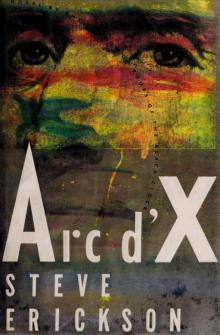 ARC D’X
ARC D’X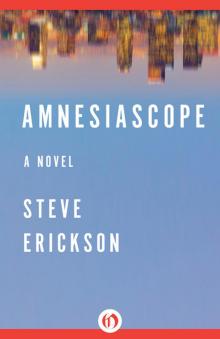 Amnesiascope
Amnesiascope Our Ecstatic Days
Our Ecstatic Days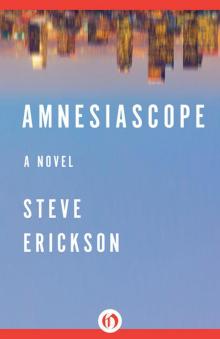 Amnesiascope: A Novel
Amnesiascope: A Novel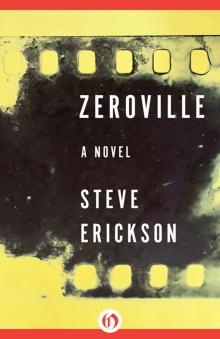 Zeroville
Zeroville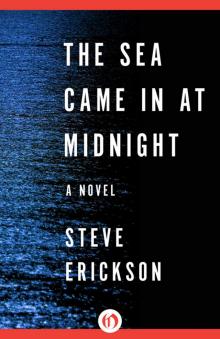 The Sea Came in at Midnight
The Sea Came in at Midnight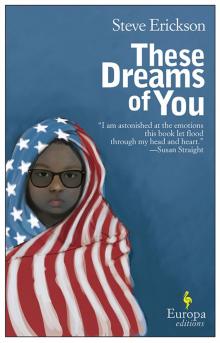 These Dreams of You
These Dreams of You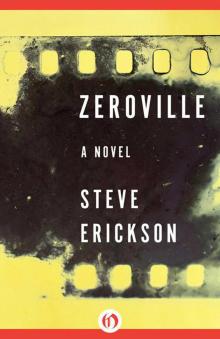 Zeroville: A Novel
Zeroville: A Novel Days Between Stations
Days Between Stations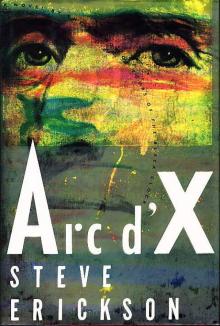 (1993) Arc d'X
(1993) Arc d'X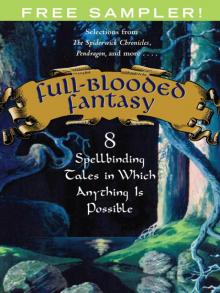 Full-Blooded Fantasy
Full-Blooded Fantasy